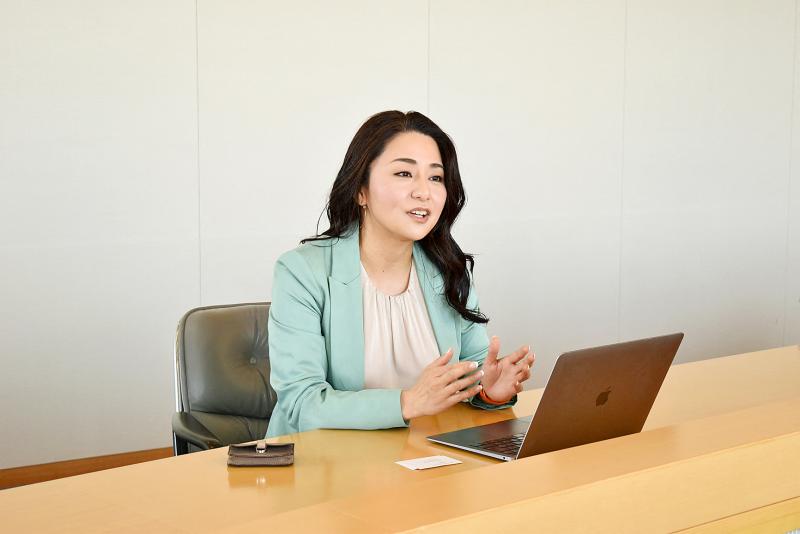Glassdoor owner Recruit Holdings said it wants to have women in 50 percent of its senior executive and managerial roles within 10 years — a rare pledge in a country where men dominate the top echelons of companies, politics and the civil service.
The push for more women at the upper levels of Japan’s largest staffing agency is part of a diversity drive to ensure a flow of bright business ideas, said Recruit chief operations officer Ayano “Sena” Senaha, its most senior female executive.
As of April 1, 21 percent of Recruit’s senior executives, including heads of major business units, were women, compared with 10 percent a year earlier, company data showed.

Photo: Reuters
“It’s a survival mechanism for us — it makes commercial sense,” Senaha said in an interview. “We don’t manufacture things, unlike many other Japanese companies, and we launch services from fresh ideas from the employee base.”
Recruit is already a corporate outlier in Japan, the world’s most aged society, where many graduates still expect to spend their whole careers working for the same firm.
Although three-quarters of Japanese firms have one or two female directors, only 5 percent have three or more, MSCI index data showed.
By contrast, two-thirds of companies in the US, 85 percent in the UK and 100 percent in France have at least three female directors.
Recruit’s workforce is young and half are women. Senaha, 39, was promoted to the board in June 2020, becoming the youngest female director among Nikkei 225 companies.
She took up her post in April last year. The company announced its pledge a month later as a measurable target to accelerate its diversity drive.
“We need that pressure,” Senaha said.
Recruit plans to nominate a third woman, Keiko Honda, as an outside director to its 10-person board at next month’s annual shareholder meeting.
Recruit has already had a female chief executive officer, Eiko Kono, from 1997 to 2004.
“It’s a great first step and I hope they expand into other measures of diversity and disclose everything,” said Nicholas Benes, a corporate governance expert.
“Diversity should also include foreigners, nationality, upbringing, education and key skills,” said Benes, who heads the Board Director Training Institute of Japan.
In past decade, Recruit’s purchase of US job search engine Indeed and job review site Glassdoor have lifted overseas revenue to about half of the company’s total from less than 4 percent. It has a market capitalization of US$60 billion.
Indeed cofounder Rony Kahan is the only foreigner on the board.
In the past few years, successive prime ministers have emphasized the need for Japanese companies to become more diverse and offer flexible working.
Under revisions to Japan’s corporate governance code last year, companies are encouraged to disclose targets for promoting diversity.
However, Japan continues to be known for long working hours, and many women still drop out of the workforce after having children. Few men take substantial paternity leave.

WEAKER ACTIVITY: The sharpest deterioration was seen in the electronics and optical components sector, with the production index falling 13.2 points to 44.5 Taiwan’s manufacturing sector last month contracted for a second consecutive month, with the purchasing managers’ index (PMI) slipping to 48, reflecting ongoing caution over trade uncertainties, the Chung-Hua Institution for Economic Research (CIER, 中華經濟研究院) said yesterday. The decline reflects growing caution among companies amid uncertainty surrounding US tariffs, semiconductor duties and automotive import levies, and it is also likely linked to fading front-loading activity, CIER president Lien Hsien-ming (連賢明) said. “Some clients have started shifting orders to Southeast Asian countries where tariff regimes are already clear,” Lien told a news conference. Firms across the supply chain are also lowering stock levels to mitigate

Six Taiwanese companies, including contract chipmaker Taiwan Semiconductor Manufacturing Co (TSMC, 台積電), made the 2025 Fortune Global 500 list of the world’s largest firms by revenue. In a report published by New York-based Fortune magazine on Tuesday, Hon Hai Precision Industry Co (鴻海精密), also known as Foxconn Technology Group (富士康科技集團), ranked highest among Taiwanese firms, placing 28th with revenue of US$213.69 billion. Up 60 spots from last year, TSMC rose to No. 126 with US$90.16 billion in revenue, followed by Quanta Computer Inc (廣達) at 348th, Pegatron Corp (和碩) at 461st, CPC Corp, Taiwan (台灣中油) at 494th and Wistron Corp (緯創) at

NEW PRODUCTS: MediaTek plans to roll out new products this quarter, including a flagship mobile phone chip and a GB10 chip that it is codeveloping with Nvidia Corp MediaTek Inc (聯發科) yesterday projected that revenue this quarter would dip by 7 to 13 percent to between NT$130.1 billion and NT$140 billion (US$4.38 billion and US$4.71 billion), compared with NT$150.37 billion last quarter, which it attributed to subdued front-loading demand and unfavorable foreign exchange rates. The Hsinchu-based chip designer said that the forecast factored in the negative effects of an estimated 6 percent appreciation of the New Taiwan dollar against the greenback. “As some demand has been pulled into the first half of the year and resulted in a different quarterly pattern, we expect the third quarter revenue to decline sequentially,”

ASE Technology Holding Co (ASE, 日月光投控), the world’s biggest chip assembly and testing service provider, yesterday said it would boost equipment capital expenditure by up to 16 percent for this year to cope with strong customer demand for artificial intelligence (AI) applications. Aside from AI, a growing demand for semiconductors used in the automotive and industrial sectors is to drive ASE’s capacity next year, the Kaohsiung-based company said. “We do see the disparity between AI and other general sectors, and that pretty much aligns the scenario in the first half of this year,” ASE chief operating officer Tien Wu (吳田玉) told an